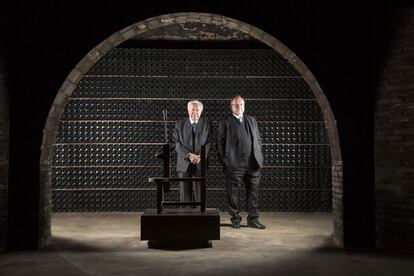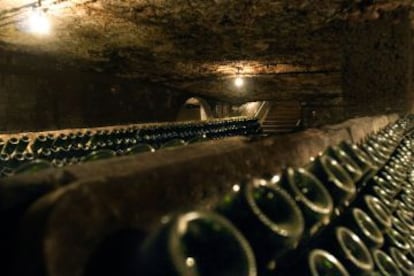Is Spain’s sparkling wine maker Freixenet losing some of its fizz?
Declining profits have uncorked infighting in this family-run Catalan cava winery

All is not sweetness and light at Freixenet, the world’s largest producer of Spain’s sparkling cava wine: on September 5, the company narrowly averted a strike by its workforce just one day before the harvest was due to begin by agreeing a 3% salary increase.
The labor dispute was followed by the company’s annual report, which showed a 5.6% fall in sales to €501 million and a 71% decline in profits to just €2.2 million.
The family-run company’s report largely attributed the poor performance to “the global financial crisis,” but internal disputes suggest deeper problems.
A 155-year history
Freixenet dates back to 1861, when Francesc Sala Ferrés set up the Casa Sala winery. Following the marriage of his granddaughter Dolors Sala Vivé to Pere Ferrer Bosch, whose family had set up La Freixeneda centuries before, the winery began making cava in 1914.
The couple had four children — three girls and a boy: Josep Ferrer, who was made president of the company in 1957. The shares were divided up between him and his three sisters.
Freixenet is controlled by three branches of the same family. The Ferrers, led by CEO Pedro Ferrer, son of honorary president Josep Ferrer, hold 42% of shares. The Bonets, led by group president José Luis Bonet, have a 29% stake. The Hevia Ferrers, represented by Chief Financial Officer Enrique Hevia, also have a 29% holding.
The company was due to hold a board meeting on March 30 to discuss its future, but the sudden death of Carmen Ferrer Sala at age 96 on that same day has put the date on hold.
The Hevias and Bonets are threatening to sell their joint stakes unless major changes are implemented in the way the company is run. Should a single buyer acquire their shares, representing 58% of the company, it would take control of Freixenet.

The Bonet and Hevia families blame the Ferrers for the company’s ongoing problems and its mounting debt, which currently stands at €150 million. They accuse the CEO of lowering the price of Freixenet’s famous black bottles in the search for new markets, rather than marketing its internationally famous cava as a luxury drink.
Either the company changes its strategy or it brings in new management, say the Bonets and Hevias. Otherwise, they’ll sell up.
Business sources say the most likely buyer for the Hevia and Bonet shares would be German winery Henkell & Co, which already has a stake in the Spanish cava market with its Cavas Hill brand. The likely asking price for a controlling 58% stake in Freixenet would be approximately €300 million.
But if the Hevias and Bonets decided to sell, Ferrer would have first option to purchase their stakes by matching that offer, although raising the capital would be very difficult, say analysts.
Sign up for our newsletter!
EL PAÍS English Edition is launching a weekly newsletter. Sign up today to receive a selection of our best stories in your inbox every Saturday morning. For full details about how to subscribe, click here.
The infighting dates back to 2013, when Dolores Ferrer passed away. “Aunt Lola,” as she was known, had always supported her brother, Josep Ferrer, who had inherited a controlling 35% stake, and when her 21% was distributed among the three families, the balance of power shifted, giving the combined forces of Bonet and Hevia greater control.
Meanwhile, the works council, represented by Sergi Lozano, has said it will respect any new shareholder provided that it isn’t an investment fund and that it continues to respect the interests of the workforce.
English version by Nick Lyne.
Tu suscripción se está usando en otro dispositivo
¿Quieres añadir otro usuario a tu suscripción?
Si continúas leyendo en este dispositivo, no se podrá leer en el otro.
FlechaTu suscripción se está usando en otro dispositivo y solo puedes acceder a EL PAÍS desde un dispositivo a la vez.
Si quieres compartir tu cuenta, cambia tu suscripción a la modalidad Premium, así podrás añadir otro usuario. Cada uno accederá con su propia cuenta de email, lo que os permitirá personalizar vuestra experiencia en EL PAÍS.
¿Tienes una suscripción de empresa? Accede aquí para contratar más cuentas.
En el caso de no saber quién está usando tu cuenta, te recomendamos cambiar tu contraseña aquí.
Si decides continuar compartiendo tu cuenta, este mensaje se mostrará en tu dispositivo y en el de la otra persona que está usando tu cuenta de forma indefinida, afectando a tu experiencia de lectura. Puedes consultar aquí los términos y condiciones de la suscripción digital.









































